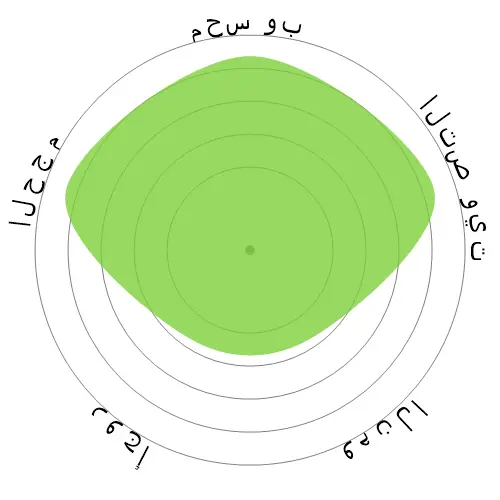معلمو المدارس الثانوية، باستثناء التعليم الخاص والتعليم التقني / المهني




الأشخاص قاموا أيضاً بالمشاهدة
مخاطر الأتمتة المحسوبة
خطر ضئيل (0-20%): المهن في هذه الفئة تحمل احتمالية منخفضة للأتمتة، حيث يتطلبون عادة حل المشكلات المعقدة، والإبداع، ومهارات التواصل القوية، ودرجة عالية من الرشاقة اليدوية. غالبًا ما تتضمن هذه الوظائف حركات يد معقدة وتنسيق دقيق، مما يجعل من الصعب على الآلات تقليد المهام المطلوبة.
مزيد من المعلومات حول ما هذه النتيجة، وكيف يتم حسابها متوفرة هنا.
استطلاع رأي المستخدمين
أصوات زوارنا تشير إلى أن هناك فرصة ضئيلة لأن يتم تحويل هذا المهنة إلى الأتمتة. يدعم هذا التقييم أيضًا بواسطة مستوى خطر الأتمتة المحسوب، الذي يقدر بـ 16٪ فرصة للأتمتة.
ما هو رأيك في مخاطر الأتمتة؟
ما هي احتمالية أن يتم استبدال معلمو المدارس الثانوية، باستثناء التعليم الخاص والتعليم التقني / المهني بالروبوتات أو الذكاء الاصطناعي في غضون العشرين سنة المقبلة؟
المشاعر
يتم تضمين الرسم البياني التالي في أي مكان يوجد فيه عدد كبير من الأصوات لتقديم بيانات ذات مغزى. تعرض هذه التمثيلات المرئية نتائج استطلاعات المستخدمين على مر الزمن، مما يوفر دلالة مهمة على اتجاهات المشاعر.
المشاعر على مر الزمن (سنوياً)
النمو
من المتوقع أن ينخفض 0٫6٪ عدد فرص العمل المتاحة لـ 'Secondary School Teachers, Except Special and Career/Technical Education' بحلول 2033
التوظيف الكلي، وفتحات الوظائف المقدرة
من المتوقع تحديث التوقعات في 09-2025.
أجور
في 2023، بلغ الأجر السنوي الوسيط لـ 'Secondary School Teachers, Except Special and Career/Technical Education' 65٬220 $، أو 31 $ في الساعة
تم دفع "Secondary School Teachers, Except Special and Career/Technical Education" بمقدار 35٫7٪ أعلى من الأجر الوسيط الوطني، الذي بلغ 48٬060 $
الأجور على مر الزمن
الحجم
بحلول 2023 كان هناك 1٬045٬170 شخص يعملون كـ 'Secondary School Teachers, Except Special and Career/Technical Education' داخل الولايات المتحدة.
هذا يمثل حوالي 0٫7٪ من القوى العاملة الموظفة في جميع أنحاء البلاد
بتعبير آخر، حوالي 1 من كل 145 أشخاص يعملون كـ 'Secondary School Teachers, Except Special and Career/Technical Education'.
وصف الوظيفة
تدريس مادة أو أكثر للطلاب في المرحلة الثانوية.
SOC Code: 25-2031.00


تعليقات
Leave a comment
Due to remote learning and using similar designs that you mentioned, we have seen a 210% spike in high school drop outs, a 600% up shot of kids having at least 2-3 failing grades, and a gap between students who do not have access to tutors, internet or computers (or all three). A robot cannot tell an elementary student to reengage their students, let alone the sheer horror of classroom discipline being thrown out. Also, lets be real honest with secondary students, if they are given a generic problem trust me they will plagiarize and copy that down (just look at quizlet, or "write my paper" for proof). A human being needs to see if a student "gets" what is going on. A Teacher needs to have group interactions (and trust me you cannot do any sort of interactions with remote even with current programs- students just shut their cameras and mute themselves). Unless you are suggesting that a "few" will benefit from this dystopia, if so thank you Nancy Devos for your insight, but we educate everyone, and not the 1%.
Do you think the software being used led to those changes or the pandemic and economic downturn itself?
Easy to pass judgment when you have already drawn your conclusions. I've taught off and on since 2008 (mostly on, mostly secondary). Quizlet is the worst example you could provide of instructional technology we could employ to help all students.
When you discuss the one percent, you highlight a certain security the wealthy have that leads to less interruptions of education and that's a fair point. But I am not trying to describe a dystopia, but rather a better way to differentiate and tailor student learning to their particular needs, desires, strengths, and weaknesses.
Much of what effective teachers do is driven by inputs, points of data, about their students and their teaching. A properly designed system could analyze those inputs and apply strategies to intervene. It doesn't really matter the input, either.
Now that we are rolling out SEL technologies to help our kids, language translation applications that can help English learners, standards-based, interactively branching assessments and activities, the amount of information received is nothing trivial. The digital divide does truly make this a difficult prospect for some students, but that's not the question we are discussing here. Can teachers be replaced by "robots" in the future? Yes. Nothing would be more student-centred.
If the argument is about the socialization of students, that's not facilitated by teachers. It's actually stunted. Imagine learning plans that don't waste time with sages on stages. Imagine a truly adaptive system to check for understanding and intervene. Imagine that happening simultaneously for all students without the interruptions all teachers face daily just trying to teach. I realize virtual, and hybrid, learning did not go well for all students, but it was year one...something never attempted, and there was a society gone wild coupled with the inexperience of systems, personnel, and students.
I love teaching. I take it personally. But, if students were able to learn better from a robot than from me, I wouldn't take it personally. I'd celebrate it.
Learning with a teacher can mean a number of scenarios, including utilizing the learning software you mentioned.
The assurance of having someone who knows more than you, or at least knows where to find answers and explain them, will result in teachers have a very secure job.
I haven't even mentioned the emotional support and connection that makes a learning environment better, something I don't foresee AI replacing because seeing assuring words pop up on my screen is not the same as hearing it from a teacher, who is making eye contact with me and using body language.
اترك ردا حول هذه المهنة